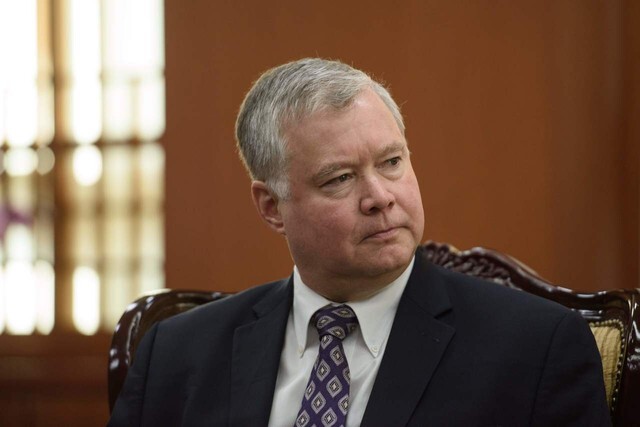hankyoreh
Links to other country sites 다른 나라 사이트 링크
[Editorial] Biegun’s S. Korea visit is last chance for US, N. Korea to hold meaningful talks

Stephen Biegun, the US State Department’s special representative for North Korea, will be arriving in South Korea on Dec. 15 for a three-day visit. His visit deserves our careful attention, since it comes at a crucial crossroads in the North Korea-US denuclearization talks. The question is whether Biegun will manage to meet with the North Koreans during his visit. Following the North’s announcement about carrying out a “very important test” and with its “end-of-the-year deadline” just around the corner, it’s no exaggeration to say that Biegun’s visit is the last chance for a meaningful meeting between North Korea and the US.
Leading up to Biegun’s visit to South Korea, the US has been alternating between bluster and appeasement. During a meeting of the UN Security Council (UNSC) on Dec. 11, the US warned North Korea that it would be wasting an opportunity if it launched a satellite or an intercontinental ballistic missile. At the same time, the US said it was ready to take a flexible approach, acting in parallel with North Korea and taking simultaneous measures. While that isn’t a big departure from the US’ previous stance, it does suggest that the emphasis has shifted toward taking a conciliatory stance toward the North. Dropping the issue of North Korean human rights from the UNSC meeting agenda, at the US’ request, suggests that the US doesn’t want to provoke the North.
But it’s unclear how much of an impact such conciliatory gestures will have on North Korea. During the UNSC meeting, China and Russia argued that it’s urgent to ease sanctions on the North and called for creating a roadmap toward that end. Considering that China and Russia were speaking on behalf of North Korea, we can infer that North Korea’s number-one desideratum is sanctions relief. The working-level talks in Stockholm back in October reportedly broke down when the US gave short shrift to that topic, inciting pushback from North Korea. What this suggests is that the two sides are unlikely to resolve their dispute until they put sanctions relief at the heart of their negotiating agenda.
Now that North Korea and the US’ demands have become somewhat more apparent, the crucial question is how far they’re willing to go to bridge the gap between them. If Biegun brings a personal letter from Trump or a new negotiating proposal with him on his trip to South Korea, there could well be a serious meeting between the two sides. But if he shows up without adequate preparations, this could end up being yet another fruitless visit. For its part, North Korea must bear in mind that, if it takes a hard line and waits for the US to make a unilateral concession, it could end up losing more than it bargained for. North Korea needs to go into this with the firm conviction that this might be its last chance and that, whatever happens, it needs to sit down with the US and reach a deal.
Please direct comments or questions to [english@hani.co.kr]

Editorial・opinion
![[Column] Season 2 of special prosecutor probe may be coming to Korea soon [Column] Season 2 of special prosecutor probe may be coming to Korea soon](https://flexible.img.hani.co.kr/flexible/normal/500/300/imgdb/original/2024/0426/3317141030699447.jpg) [Column] Season 2 of special prosecutor probe may be coming to Korea soon
[Column] Season 2 of special prosecutor probe may be coming to Korea soon![[Column] Park Geun-hye déjà vu in Yoon Suk-yeol [Column] Park Geun-hye déjà vu in Yoon Suk-yeol](https://flexible.img.hani.co.kr/flexible/normal/500/300/imgdb/original/2024/0424/651713945113788.jpg) [Column] Park Geun-hye déjà vu in Yoon Suk-yeol
[Column] Park Geun-hye déjà vu in Yoon Suk-yeol- [Editorial] New weight of N. Korea’s nuclear threats makes dialogue all the more urgent
- [Guest essay] The real reason Korea’s new right wants to dub Rhee a founding father
- [Column] ‘Choson’: Is it time we start referring to N. Korea in its own terms?
- [Editorial] Japan’s rewriting of history with Korea has gone too far
- [Column] The president’s questionable capacity for dialogue
- [Column] Are chaebol firms just pizza pies for families to divvy up as they please?
- [Column] Has Korea, too, crossed the Rubicon on China?
- [Correspondent’s column] In Japan’s alliance with US, echoes of its past alliances with UK
Most viewed articles
- 1‘We must say no’: Seoul defense chief on Korean, USFK involvement in hypothetical Taiwan crisis
- 2[Editorial] Korea’s surprise Q1 growth requires objective assessment, not blind fanfare
- 3[Column] Season 2 of special prosecutor probe may be coming to Korea soon
- 4Division commander ordered troops to enter raging flood waters before Marine died, survivor says
- 5Is Japan about to snatch control of Line messenger from Korea’s Naver?
- 6The dream K-drama boyfriend stealing hearts and screens in Japan
- 7[Column] ‘Choson’: Is it time we start referring to N. Korea in its own terms?
- 8No good, very bad game for Korea puts it out of Olympics for first time since 1988
- 9[Special report- Part III] Curses, verbal abuse, and impossible quotas
- 10S. Korea “monitoring developments” after report of secret Chinese police station in Seoul